Related Research Articles

Richard Milhous Nixon was the 37th president of the United States, serving from 1969 to 1974. A member of the Republican Party, Nixon previously served as the 36th vice president from 1953 to 1961, having risen to national prominence as a representative and senator from California. After five years in the White House that saw the conclusion to the U.S. involvement in the Vietnam War, détente with the Soviet Union and China, and the establishment of the Environmental Protection Agency, he became the only president to resign from the office, following the Watergate scandal.

The 1968 United States presidential election was the 46th quadrennial presidential election, held on Tuesday, November 5, 1968. The Republican nominee, former vice president Richard Nixon, defeated the Democratic nominee, incumbent vice president Hubert Humphrey, and the American Independent Party nominee, Alabama Governor George Wallace.

The 1972 United States presidential election was the 47th quadrennial presidential election. It was held on Tuesday, November 7, 1972. Incumbent Republican President Richard Nixon from California defeated Democratic U.S. Senator George McGovern of South Dakota. Until the 1984 election, this was the largest margin of victory in the Electoral College for a Republican in a U.S. presidential election, and as of 2020 it remains the largest margin of the popular vote won by any Republican presidential candidate. It was the first time when California had more electoral votes than New York.

The Watergate scandal was a major political scandal in the United States involving the administration of U.S. President Richard Nixon from 1972 to 1974 that led to Nixon's resignation. The scandal stemmed from the Nixon administration's continual attempts to cover up its involvement in the June 17, 1972 break-in of the Democratic National Committee headquarters at the Washington, D.C. Watergate Office Building. After the five perpetrators were arrested, the press and the U.S. Justice Department connected the cash found on them at the time to the Nixon re-election campaign committee. Further investigations, along with revelations during subsequent trials of the burglars, led the U.S. House of Representatives to grant its judiciary committee additional investigation authority to probe into "certain matters within its jurisdiction", and the U.S. Senate to create a special investigative committee. The resulting Senate Watergate hearings were broadcast "gavel-to-gavel" nationwide by PBS and aroused public interest. Witnesses testified that the president had approved plans to cover up administration involvement in the break-in, and that there was a voice-activated taping system in the Oval Office. Throughout the investigation, the administration resisted its probes, which led to a constitutional crisis.

John Newton Mitchell was an American lawyer, the 67th Attorney General of the United States under President Richard Nixon, chairman of Nixon's 1968 and 1972 presidential campaigns, and a convicted criminal. Prior to that, he had been a municipal bond lawyer and one of Nixon's closest personal friends.
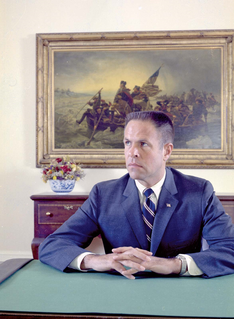
Harry Robbins "Bob" Haldeman was an American political aide and businessman, best known for his service as White House Chief of Staff to President Richard Nixon and his consequent involvement in the Watergate scandal.

Alexander Porter Butterfield is an American retired military officer, public servant, and businessman. He served as the deputy assistant to President Richard Nixon from 1969 to 1973. He revealed the White House taping system's existence on July 13, 1973, during the Watergate investigation, but had no other involvement in the scandal. From 1973 to 1975, he served as administrator of the Federal Aviation Administration.

The Paris Peace Accords, officially titled the Agreement on Ending the War and Restoring Peace in Viet Nam, was a peace treaty signed on January 27, 1973, to establish peace in Vietnam and end the Vietnam War. The treaty included the governments of the Democratic Republic of Vietnam, the Republic of Vietnam, and the United States, as well as the Republic of South Vietnam (PRG) that represented South Vietnamese communists. US ground forces up to that point had been sidelined with deteriorating morale and gradually withdrawn to coastal regions, not taking part in offensive operations or much direct combat for the preceding two-year period. The Paris Agreement Treaty would in effect remove all remaining US Forces, including air and naval forces in exchange. Direct U.S. military intervention was ended, and fighting between the three remaining powers temporarily stopped for less than a day. The agreement was not ratified by the United States Senate.
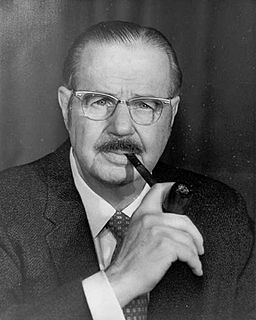
Hugh Doggett Scott Jr. was an American lawyer and politician. A member of the Republican Party, he represented Pennsylvania in the US House of Representatives from 1947 to 1959 and in the US Senate, from 1959 to 1977. He served as Senate Minority Leader from 1969 to 1977.
The Nixon White House tapes are audio recordings of conversations between U.S. President Richard Nixon and Nixon administration officials, Nixon family members, and White House staff, produced between 1971 and 1973.
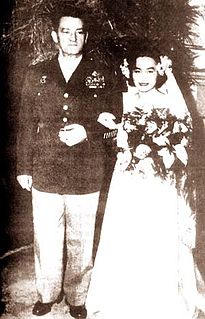
Anna Chennault, born Chan Sheng Mai later spelled Chen Xiangmei, also known as Anna Chan Chennault or Anna Chen Chennault, was a war correspondent and prominent Republican member of the U.S. China Lobby. She was married to American World War II aviator General Claire Chennault.
This bibliography of Richard Nixon includes publications by Richard Nixon, the 37th president of the United States, and books and scholarly articles about him and his policies.

Richard Nixon's tenure as the 37th president of the United States began with his first inauguration on January 20, 1969, and ended when he resigned on August 9, 1974, in the face of almost certain impeachment and removal from office, the only U.S. president ever to do so. He was succeeded by Gerald Ford, whom he had appointed vice president after Spiro Agnew became embroiled in a separate corruption scandal and was forced to resign. A prominent member of the Republican Party from California, Nixon took office after the 1968 presidential election, in which he defeated incumbent Vice President Hubert Humphrey. Although he had built his reputation as a very active Republican campaigner, Nixon downplayed partisanship in his 1972 landslide reelection.
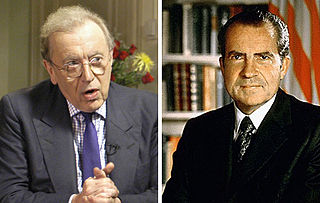
The Nixon interviews were a series of conversations between American President Richard Nixon and British journalist David Frost, produced by John Birt. They were recorded and broadcast on television and radio in four programs in 1977. The interviews later became the central subject of Peter Morgan's play Frost/Nixon in 2006.
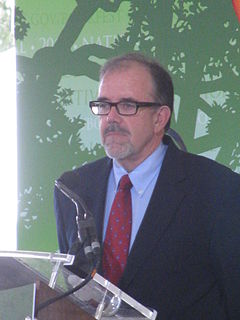
John Aloysius Farrell is an American author. He has written biographies of U.S. President Richard Nixon, House Speaker Thomas "Tip" O'Neill, and defense attorney Clarence Darrow. He is a former White House correspondent and Washington editor for The Boston Globe and a former Washington bureau chief and columnist for The Denver Post.
Lori Cox Han is a Professor of Political Science and Doy B. Henley Endowed Chair in American Presidential Studies at Chapman University in Orange, California. Her research interests include the American presidency, women and politics, media and politics, and political leadership.
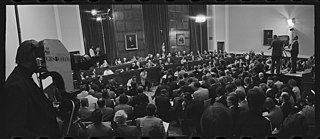
The impeachment process against Richard Nixon began in the United States House of Representatives on October 30, 1973, following the series of high-level resignations and firings widely called the "Saturday Night Massacre" during the course of the Watergate scandal.
The Vietnam stab-in-the-back myth asserts that the United States' defeat in the Vietnam War was caused by various American groups, such as civilian policymakers, the media, anti-war protesters, the United States Congress, political liberals, or the Democratic Party. Used primarily by right-wing war hawks, the name "stab-in-the-back" is analogous to the German stab-in-the-back myth, which claims that internal forces caused the German defeat in World War I. Unlike the German myth, the American variant lacks an antisemitic aspect. Jeffrey Kimball wrote that the United States' defeat "produced a powerful myth of betrayal that was analogous to the archetypal Dolchstoss legend of post-World War I Germany".
Jeffrey P. Kimball is an American historian and emeritus professor at Miami University. Among the ideas that Kimball developed was the idea of a Vietnam stab-in-the-back myth. He also argued that threats to use nuclear weapons had not been effective at advancing the United States' foreign policy goals either in the Korean War, Vietnam War, or the First Taiwan Strait Crisis. Historian Luke Nichter wrote that Kimball's books "shaped future works, and these volumes on my shelves stand as a reminder that my own work on the Nixon tapes would not have happened without them". According to historian Ken Hughes, Kimball is "the leading scholar of the 'decent interval'": the idea that Nixon eventually settled for securing a "decent interval" before South Vietnamese defeat. Hughes regrets that Kimball's work is "virtually unknown" outside academia.
Decent interval is a theory regarding the end of the Vietnam War which argues that from 1971 or 1972, the Nixon Administration abandoned the goal of preserving South Vietnam and instead aimed to save face by preserving a "decent interval" between withdrawal and South Vietnamese collapse. Therefore, Nixon could avoid becoming the first United States president to lose a war.
References
- ↑ "Ken Hughes". Miller Center. 2 February 2017. Retrieved 2 September 2020.
- ↑ Greenberg, David (31 July 2014). "Nixon lawlessness before Watergate". Washington Post. Retrieved 2 September 2020.
- ↑ Nevin, Mark D. (2015). "Chasing Shadows: The Nixon Tapes, the Chennault Affair, and the Origins of Watergate by Ken Hughes. Charlottesville, University of Virginia Press, 2014. 240 pp. $24.95". Political Science Quarterly. 130 (2): 351–353. doi:10.1002/polq.12348.
- ↑ Kucharski, Anastasia (2016). "Chasing Shadows: The Nixon Tapes, the Chennault Affair, and the Origins of Watergate KenHughes. Charlottesville: University of Virginia Press, 2014". The Journal of American Culture. 39 (3): 357–358. doi:10.1111/jacc.12582.
- ↑ Arnold, Peri (2016). "Ken Hughes. Chasing Shadows: The Nixon Tapes, the Chennault Affair, and the Origins of Watergate . Charlottesville: University of Virginia Press, 2014. Pp. x+228. $24.95 (cloth)". American Political Thought. 5 (1): 178–181. doi:10.1086/684562.
- ↑ Glen, John (2 February 2017). "Book Reviews: Chasing Shadows". HistoryNet. Retrieved 2 September 2020.
- ↑ "Nonfiction Book Review: Chasing Shadows: The Nixon Tapes, the Chennault Affair, and the Origins of Watergate by Ken Hughes. Univ. Of Virginia, $24.95 (240p) ISBN 978-0-8139-3663-5". PublishersWeekly.com. Retrieved 2 September 2020.
- ↑ Frankum, Ronald B. (September 2017). "Nixon and the American Failure in Vietnam: Review Essays". Presidential Studies Quarterly. 47 (3): 601–603. doi:10.1111/psq.12404.
- ↑ Foster, Cody J. (2017). "Foster on Hughes, 'Fatal Politics: The Nixon Tapes, the Vietnam War, and the Casualties of Reelection'". H-War .
- ↑ Milam, Ron (2016). "Fatal Politics: The Nixon Tapes, the Vietnam War, and the Casualties of Reelection by KenHughes. Charlottesville, University of Virginia Press, 2015. 288 pp. $24.95". Political Science Quarterly. 131 (3): 639–641. doi:10.1002/polq.12513.